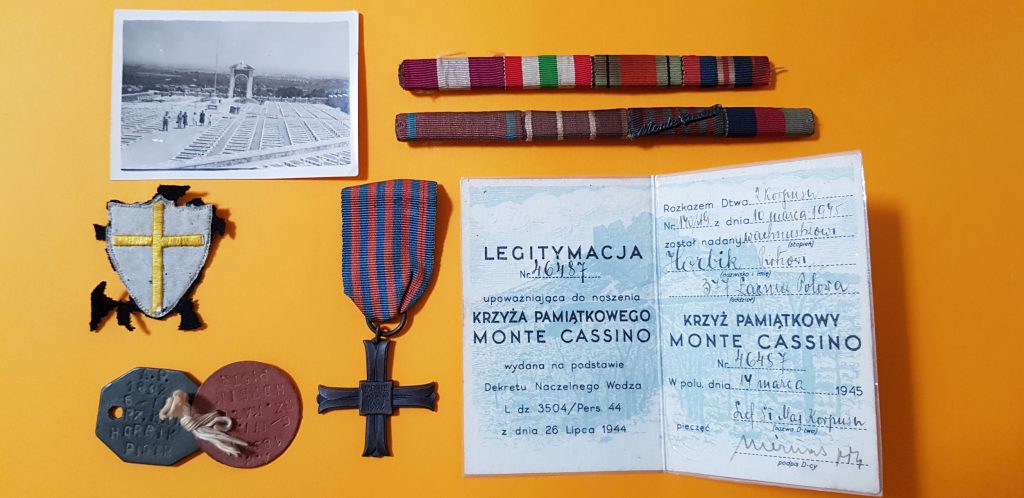Wachmist Piotr Horbik – head of 377 Field Baths
When the war broke out in 1939, the Horbik family lived in Duniówowicz, in the Poviat of Stanisławski, in the province of Vilnius. Piotr Horbik was the commandant of the Border Protection Corps post in Zanarocze. After the USSR invaded Poland, the NKVD arrested him on September 19, 1939 and imprisoned him. On 13.04.1940, he deported his wife Zofia with children, Władysław, Zdzisław and Halina, to Semijarska (Mielkombinat), in the Beskaragaj region, in the Pavlodar region, in the Kazakh SRS. In August 1941, after the “amnesty” for Poles was announced, Piotr Horbik joined the Polish Army, with which he was evacuated to Persia (now Iran). He took part in the Italian campaign. After the war, he was transported to Great Britain with the 2nd Polish Corps and demobilized there. The family from the exile expatriated to Poland and in June 1946 came to Łobz, and from there was transported to the village of Karów, in the then commune Bełczna (currently Karwowo, Łobez commune). Piotr wrote a letter to his wife (Apanasionek), who lives in the USA, who already knew where Zofia was and gave him her address in Poland. The sister helped the family by sending parcels with clothes, and her husband – parcels with food. Piotr came from England to the country on October 26, 1947 and joined the family in Karwów.

Horbik Piotr (1892-1969), son of Antoni, born on in Pasieki (Biskupice commune, Wołkowysk poviat, Bialystok voivodeship). He was the commander of the KOP post in Zanarocze. Arrest. September 19, 1939 and sent to the labor camp. After the so-called amnesty for Poles, he was released and joined the Polish Army in the USSR (registration no. 1892/6 / III), most likely in Tatiszczewo, because the 5th Infantry Division was formed there, and he was incorporated on September 7, 1941, with the assignment to 5 light artillery regiment. In February 1942, he was transferred to the 10th Light Artillery Regiment of the 10th Infantry Division, which was evacuated on March 31 to the Middle East in the first wave. Soldiers from the port in Krasnowodzko crossed the Caspian Sea on the ship “Agamala Ogły” and on April 1 they reached the quay in Pahlevi, Persia (now Iran). From there, the 10th Regiment, on 13 April, was transported through Iraq to Palestine, and after two weeks arrived in Geder. According to the order of the Commander-in-Chief, on 3 May 1942, the 3rd Carpathian Rifle Division was created, and after joining the 10th Regiment, it was renamed the 3rd Carpathian Light Artillery Regiment. Piotr Horbik, due to his age (he was 50), was directed to the 2nd squadron of the stage gendarmerie. The following year, he was entrusted with the function of head of field bathhouse No. 377, which he held until the end of the war. After stationing the 2nd Corps in Italy for one year, on August 15, 1946, Horbik left Italy from the 3rd stake and was transported by land to France, then by ship through the English Channel to Great Britain. He ended his service as a master, as head of the battery of the 3rd Carpathian Light Artillery Regiment. He returned from England to the country on October 26, 1947. In a military booklet issued in Gryfice, he stated that he knew the languages: Italian, Russian and German. In Karwów, he worked in the accounting department of the State Farms Real Estate, transformed into a state-owned farm in 1949. Ck Karwowo.
Decorated with: Bronze Cross of Merit with Swords, Monte Cassino Commemorative Cross (46487), Army Medal and British: Star for the War of 1939-1945, Star of Italy and Medal of War.
Horbik Zofia (1907-2000); c. Władysław and Zuzanna Apanasionków, born on in Duniówowicz. She had a brother Piotr, who worked in the court in Duniówowicz (married to Franciszka). She lived in Karwów and rests there.
Horbik Władysław (1930-2004), born on in Attitudes. He was a teacher in Warsaw. He is buried at the cemetery of the Evangelical Reformed parish in Warsaw.
Horbik Zdzisław (1933-1950). He died in a road accident on the “Dalnowska hill” near Dalna. Ck Karwowo.
Horbik Halina (1934) pm. Digger. She graduated from the pedagogical high school in Kamień Pom. She married Stanisław Kopaczka. She lived in Węgorzyno, where she worked as a primary school teacher. He lives in Szczecin.
